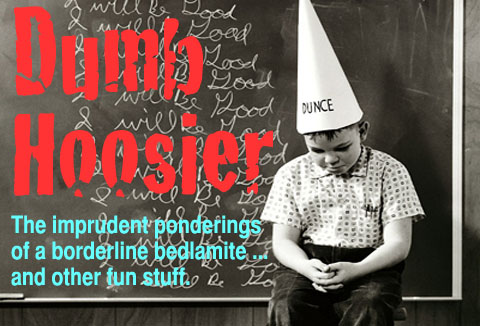Public Employee
Benefits Are Unsustainable
By Gary Gerard, dumbhoosier.com
It must have been an extra long winter in Wisconsin
this
year.
I mean really, it seems at the first hint of spring people there are
going a little bit bonkers.
The governor has proposed cutbacks in teacher pensions and benefits and
wants changes in collective bargaining between school districts and
teacher unions.
It's really been quite crazy up there this past week, and I fear this
is going to be a scenario that plays out over and over.
That's because lots of states other than Wisconsin face similar
dilemmas because they are teetering on the verge of insolvency. There's
been talk of states having to declare bankruptcy and whether or not
that's even something that's constitutional.
The federal government is broke, so there's no help there.
Anytime there is a bad time in the economy, it always hits the private
sector first and then trickles into government. There's a lag in tax
dollars flowing to governments because of budget cycles.
So my guess is what's happening in Wisconsin isn't far off from
happening all over this great land.
I'm not taking sides here, just pointing out what I believe is an
inescapable eventuality.
But since it's happening in Wisconsin, let's think about that for a
moment.
But before we do, please understand that what I am about to write has
little to do with teachers. It has to do with government and unions and
tax dollars.
I hold no ill will toward teachers. They have a difficult and often
thankless job, especially in today's America where there is dwindling
parental support for their efforts. The vast majority of teachers do a
good job of educating our kids as they pick their way through a maze of
federal and state mandates, regulations and testing criteria.
My hat's off to them.
On to Wisconsin. What struck me most about the Wisconsin uprising was
the relatively mild nature of what the governor proposed.
From my understanding, facing a two-year projected deficit of $3.6
billion, he's asking teachers and other public sector union members for
concessions. (Firemen and cops were excluded.)
He's asking these public sector union members to contribute 5.8 percent
of their salaries to pensions and another 12 percent to healthcare
premiums.
On top of that, he's asking that unions be involved in bargaining with
regard to salaries only, but not for benefits and perks.
What's really striking about this is how marginal the savings generated
by the governor's plan would be with regard to the deficits they're
facing - just around 8 percent.
I understand why public sector union employees in Wisconsin wouldn't
like to give stuff up, but is this really too much to ask?
(By the way, the average teacher salary in Wisconsin is $48,743.)
In this economy and with a national deficit running at $14 trillion, it
seems reasonable, if not at least a good starting point, for
negotiations.
If you're a private sector worker, those numbers probably look pretty
good to you. How many private sector workers even have pensions? If
they do, it's likely in the form of a 401(k). If a company matches your
401(k) contribution at a rate of 50 cents on the dollar, you're doing
pretty darn good.
The idea of a company fully funding your pension in the private sector
is unheard of.
And there's a reason for that.
It is those underfunded pension liabilities for public employees that
are burying state budgets.
The Pew Research Center has just issued a new report on the problem.
They say $3.35 trillion has been promised to public employees for their
retirement pensions.
The problem?
The states only have $2.35 trillion of it.
State taxpayers across this great land are on the hook for a cool $1
trillion to meet the demands of retiring public employees.
The Pew study notes:
- In 2000, just over half the states had fully funded pension systems.
By 2006, that number had shrunk to six states. By 2008, only four -
Florida, New York, Washington and Wisconsin - could make that claim.
- In eight states - Connecticut, Illinois, Kansas, Kentucky,
Massachusetts, Oklahoma, Rhode Island and West Virginia - more than
one-third of the total pension liability was unfunded. Two states -
Illinois and Kansas - had less than 60 percent of the necessary assets
on hand.
- Nine states were deemed solid performers, having enough assets to
cover at least 7.1 percent - the 50-state average - of their
non-pension liabilities. Only two states - Alaska and Arizona - had 50
percent or more of the assets needed.
- Forty states were classified as needing improvement, having set aside
less than 7.1 percent of the funds required. Twenty of these have no
assets on hand to cover their obligations.
This is not uncharted territory. Look at what happened in the auto
industry.
Over the years, the unions negotiated some really sweet benefits for
autoworkers. Things like killer pensions and lifelong health care. A
downturn in the auto business and the economy at large and wham!
They're bankrupt.
I'm not saying that public employees don't deserve those benefits. And
I'm not saying that those benefits are the sole deficits.
What I am saying is that the state governments simply can't afford to
pay for them.
Something's gotta give. And give it has, in Wisconsin.
I don't know how this will play out, but I do know one thing for sure:
In many states, the contracts that public employees work under are
simply unsustainable.
Archives
|
